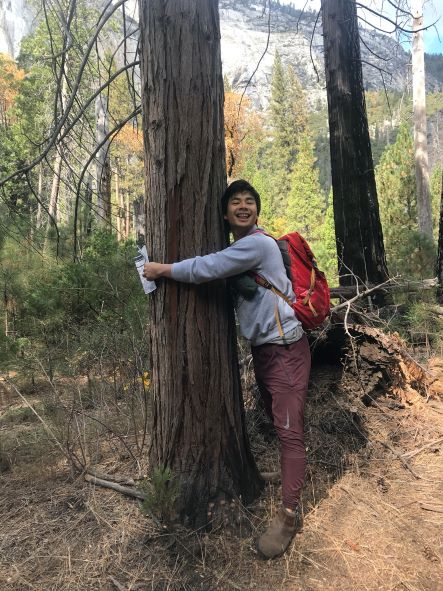This blogpost was written by Bing Lin, STEP Ph.D.
The Science, Technology, and Environmental Policy (STEP) PhD program in SPIA has been my actual and virtual home for the past two years, and for those itching to tackle interdisciplinary policy problems in the natural and social sciences, it could just be yours, too! Spanning the full gamut of policy research on energy and the environment, the STEP curriculum is eclectic, interconnected, and increasingly relevant in the face of complex global problems. Unsurprisingly, it also attracts candidates from the world over and all walks of life. With backgrounds ranging from ecology to economics to engineering, STEP students have had past lives as diverse as in public office, policy analysis, civil rights law, and even climate negotiations for the Paris Agreement.
My own background, while less illustrious, has also been a combination of cultures and coursework. I was born and raised in Indonesia, in a Taiwanese household, going to an international school. In college, I vacillated between majors in math, psychology, computer science, ecology and evolutionary biology, and more. Today, this indecision over intermixing interests has segued well into an appreciation of the STEP spirit, and my current research interests at the intersection of the behavioral sciences, conservation ecology, and environmental policy in coral reef socio-ecological systems. Fear not, however, if the human dimensions of reef conservation does not tickle your fancy (though it clearly should). The flexibility of the program means that you can research practically anything you and your advisor are mutually onboard with, from resiliency in climate adaptation for smallholder farmers, to co-benefits of urban decarbonization in Asia, to land-use change and its implications for biodiversity, and anything beyond and in between.
After receiving that sweet sweet acceptance on fancy black and orange letterhead, you’ll likely start your STEP adventure, come August, doing at least one of three things. One, you’ll complain about the PhD Summer Program, despite it being a three-week symposium of socializing and meet-and-greets with fellow classmates, masquerading as a quantitative refresher course to kick off your PhD journey. Two, you’ll probably compare Princeton to Hogwarts, from buildings to the way free food magically appears from thin air everywhere (Disclaimer: COVID has temporarily dispelled this magic trick). And three, you’ll be shocked by how truly interdisciplinary the STEP curriculum is, operationalized when you find yourself enrolled in courses you never realized you knew so little about.
As classes get underway, STEP students begin their swim through the sea of curriculum requirements, and truly come into their own. In the first two years, students complete five courses in quantitative analysis, economics, and politics; three classes in fields relevant to each student’s research; a paper of publishable quality; two 12-hour general exams; and any incidental summer fieldwork, assistant instructorships, and side projects as they arise. While eyes will be rolled at your less course-laden colleagues in other departments, from these seemingly unending prerequisites will also arise a deep appreciation for how disparate fields magically mesh. The hidden connections you find between subjects exude an understated elegance, and stretch your perspective to dimensions from which you can never return. As Richard Feynman once said, “If our small minds, for some convenience, divide this universe into parts—physics, biology, geology, astronomy, psychology, and so on—remember that nature does not know it”. Dick is right, of course, and STEP encapsulates this sentiment better than any place or program I’ve been or seen.
Take, for instance, the coursework that eventually informed my second-year paper. My psychology class with Elke Weber revealed the constructive power of social norms in shaping environmental decisions and actions. Conservation ecology with David Wilcove articulated the myriad roles people play in harming as well as helping biodiversity. Global environmental governance with Michael Oppenheimer and two colorful NYU law professors deconstructed the traits of multinational treaties most conducive to environmental change. Qualitative methods with Cassandra Emmons underscored the importance of incorporating diverse stakeholder viewpoints into qualitative research. And inspired by this compendium of coursework, I wrote a Perspective piece on the underutilized role of regulatory policies to catalyze social norm shifts in recreational scuba divers and how they interact with coral reefs, now fresh off the press in the journal Coral Reefs.
Rigorous coursework aside, another huge perk of the STEP program is the stellar constellation of characters with whom you get to share classrooms and conversations every day. Fast friends are made with students in the vibrant MPA program, though heartbreak awaits when they graduate in two years on their way to becoming your future bosses. Fellow STEP PhDs are a goldmine of company, collaboration, and commiseration; an essential component of what makes STEP special. Your high-flying peers are also invariably thoughtful friends, passionate people, wildly accomplished, and probably smarter than you. (Fret not, chocolate-covered pretzels and IPAs at one of the countless weekly STEP Happy Hours can soothe any lingering feelings of inadequacy.)
Overall, even despite a year-long bout of Zoom gloom, STEP has remained my idyllic little corner of academe. The curriculum rigor provides ample ammunition to inform dissertation ideas and serves as the scaffolding from which students can subsequently soar, or to which I can attest, at least flap. And while the path to any PhD is peppered with whims, woes, and just sometimes, a global pandemic, STEP can even turn lockdown lemons into research lemonade.
I love the people, the program, and all the free food. My adviser is awesome, a first-rate scientist and friend. Program perks are off the charts, including generous funding and stipends for tech, travel, teaching, and more. The faculty is an overpowered microcosm of cross-appointed professors and practitioners. And in a world of wicked problems, growing uncertainty, and systemic socio-ecological issues, STEP equips aspiring changemakers with the tools necessary to truly make a difference, both at Princeton and beyond.

Pictures courtesy of Bing Lin (@thebinglin on Twitter).


